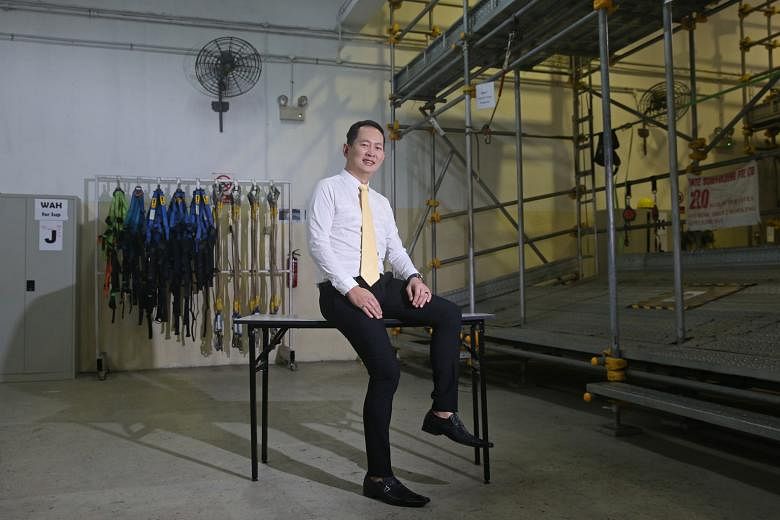Fang Koh Look is intimately acquainted with uncertainty and knows too well how menacing it can be.
It was a constant presence when he first started Absolute Kinetics Consultancy (AKC), an outfit offering safety consultancy services, more than 15 years ago.
With no savings, two toddlers to feed and a third baby on the way, he worked from the bedroom of his home and even had to borrow money from his wife to buy a laptop.
"She lent me the money but also showed me her bank balance; she only had $300 left," he recalls. "It struck me then I could not fail."
He did not. Although he faced many challenges and even squared off with death while doing so, he grew AKC from a one-man show to a $100 million outfit with more than 100 staff in just one decade. The company has also diversified into skills and safety training, telco and F&B services, as well as property investments.
The four-room Bukit Batok HDB flat where he started AKC is long gone; he and his family will soon move into a good class bungalow in King Albert Park.
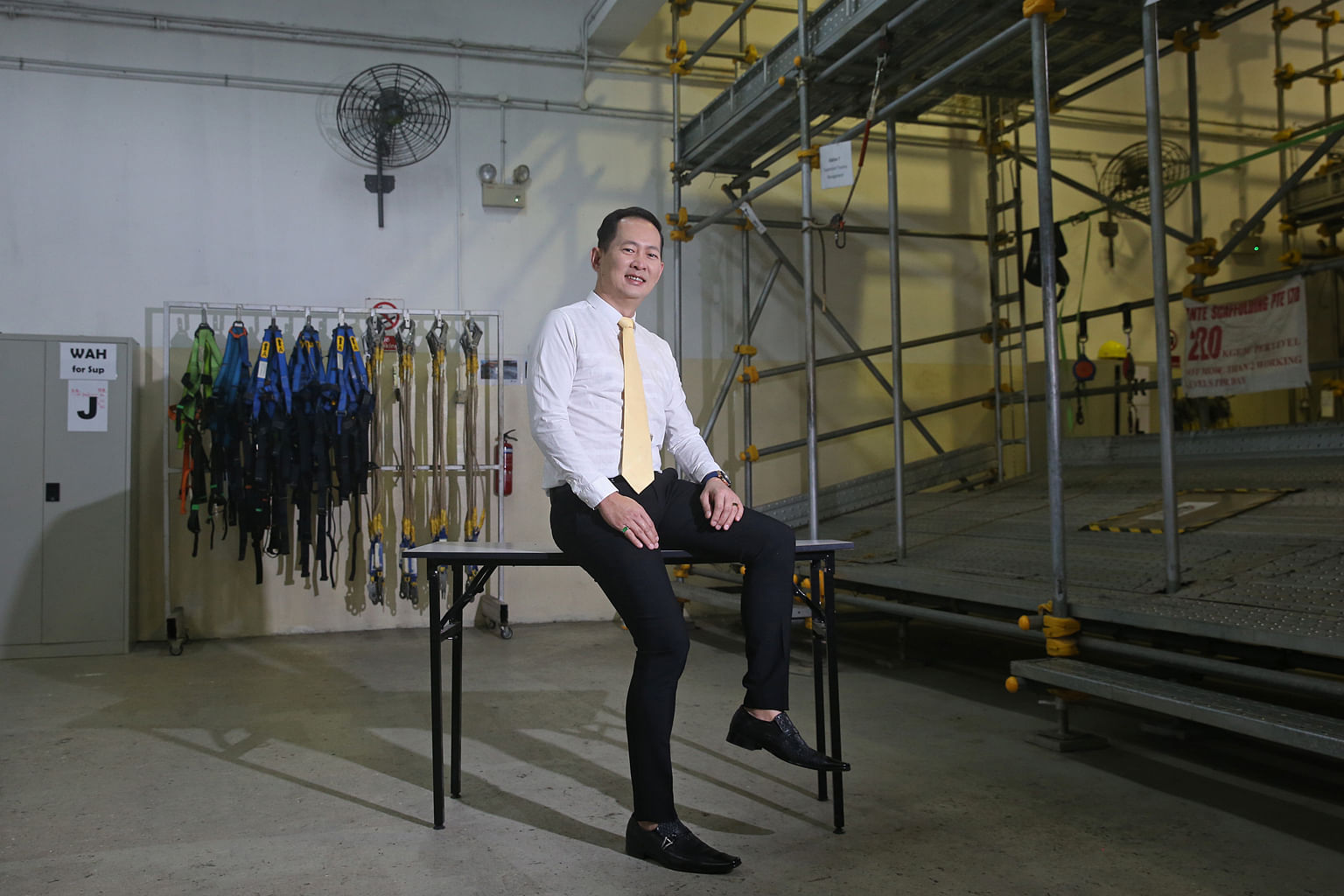
Hope, he says, was what kept him going although he is still surprised by how far he has come.
The ninth of 10 children of rubber tappers, he grew up in Sepang, in a remote village not far from where Malaysia's Formula One circuit now is.
"My father came from Fuzhou when he was five and only had Primary 3 education. My mother is illiterate. They were rubber tappers but saved enough to buy some land to grow rubber trees and oil palm," says the 48-year-old entrepreneur.
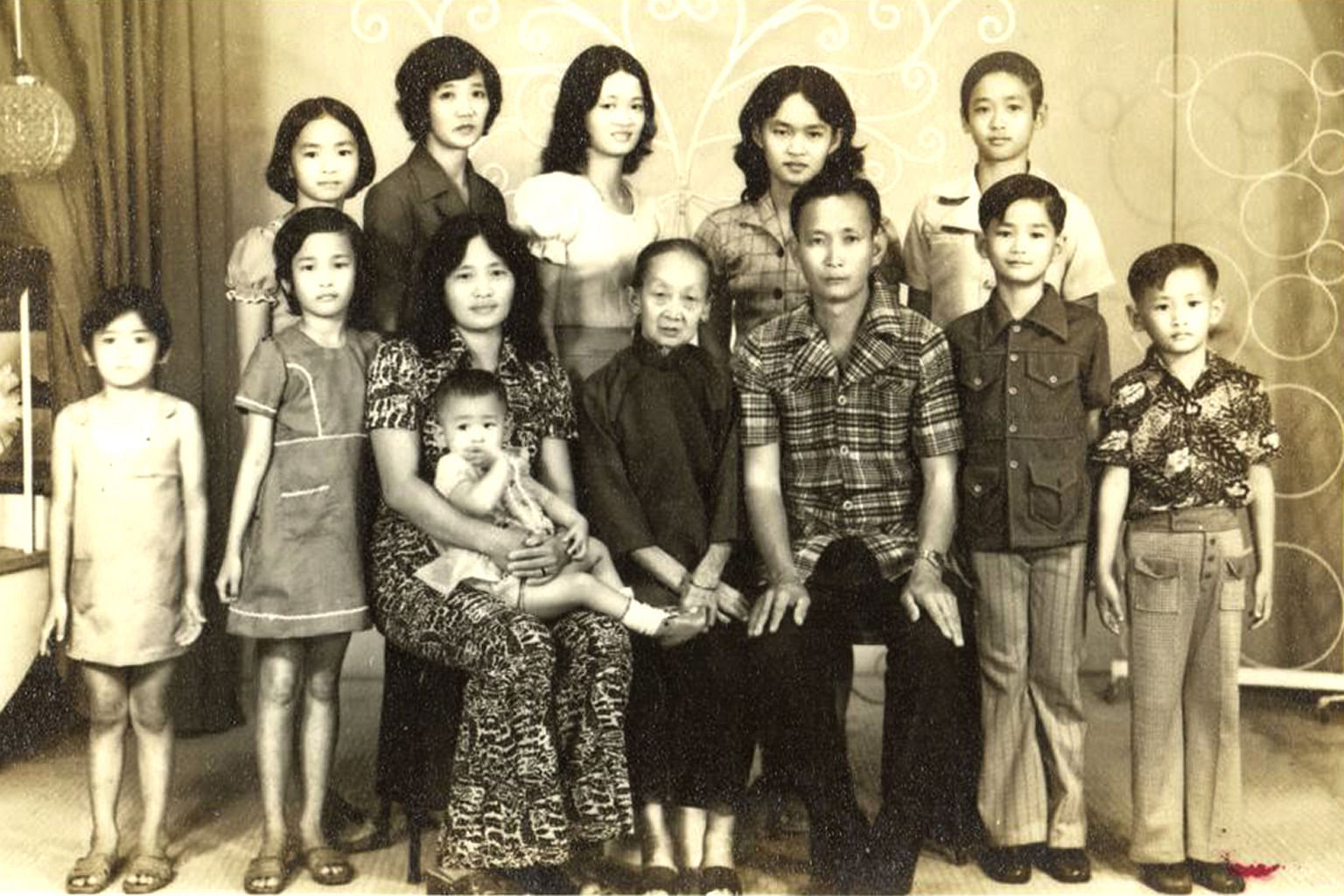
Seeing how hard his parents worked, he decided early on that the village life was not for him.
"My mother was pregnant when she went out one morning with a candle and a ladder to tap rubber. It was still dark, she tripped over something and lost her baby," he says, adding that she had another miscarriage while working.
His parents were the first in the village to sell parcels of land to finance their children's education; two of his elder siblings went to university in the United States and Canada.
Although Mr Fang - who went to Chinese and Malay medium schools - did well in his studies, he wanted a better education than what was available in Malaysia. That was how he ended up in Singapore when he was 16, the first time he crossed the Causeway.
"I'd heard about how organised Singapore was, how good the schools were," he says.
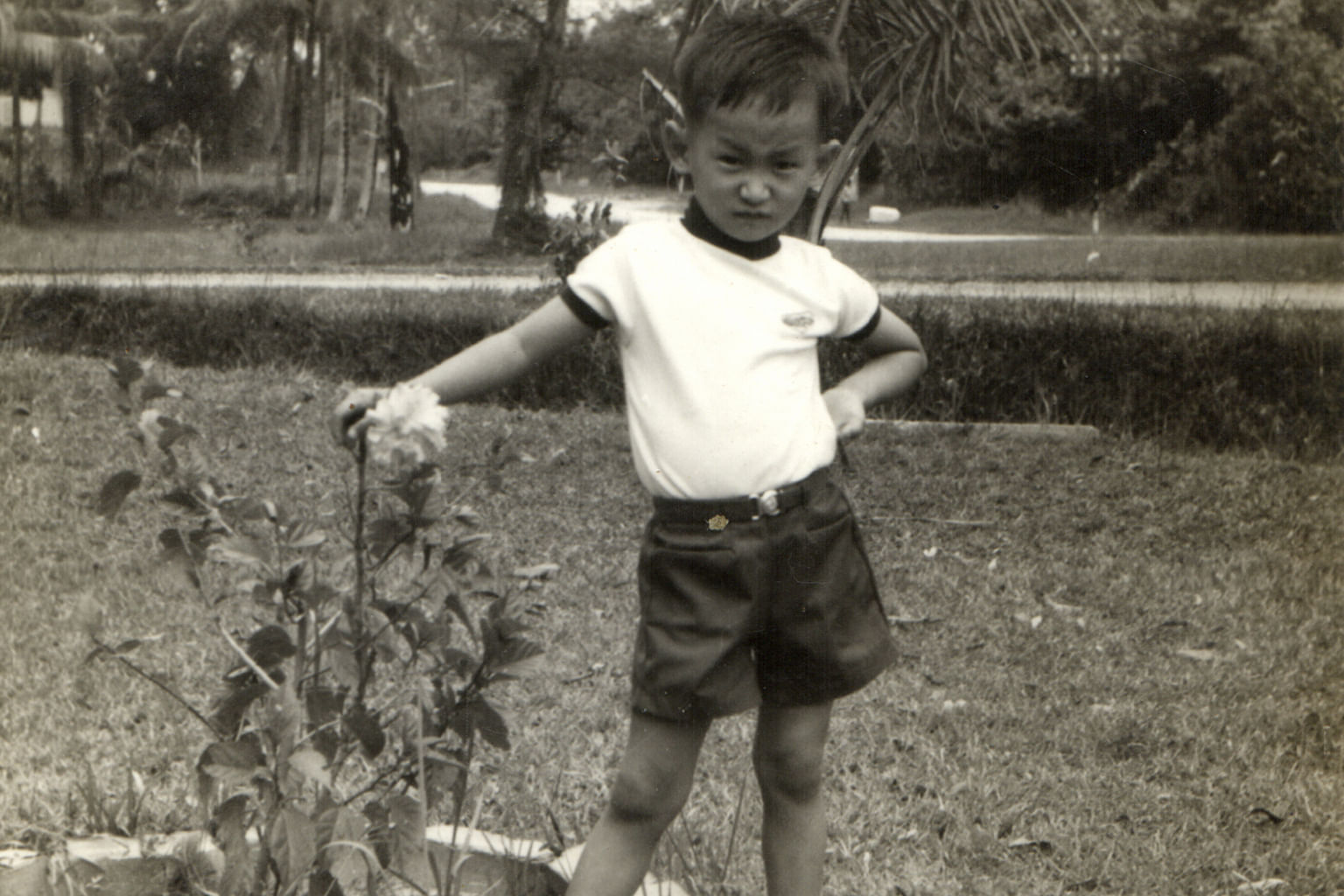
A family friend helped to get him into Mayfair Secondary School. He barely passed the entrance examinations because his English was rudimentary.
The school decided Mr Fang - a science student in Malaysia - should be placed into Secondary 2 in the arts stream.
"I appealed. I would be nearly three years older than my classmates and I really wanted to study science," he says, adding that the principal finally agreed to put him in a Secondary 3 science class on probation.
Settling in, he says, was not easy.
"When I first spoke, my classmates laughed because my English was kindergarten standard. But I told myself not to be discouraged. They could laugh but I was here to learn."
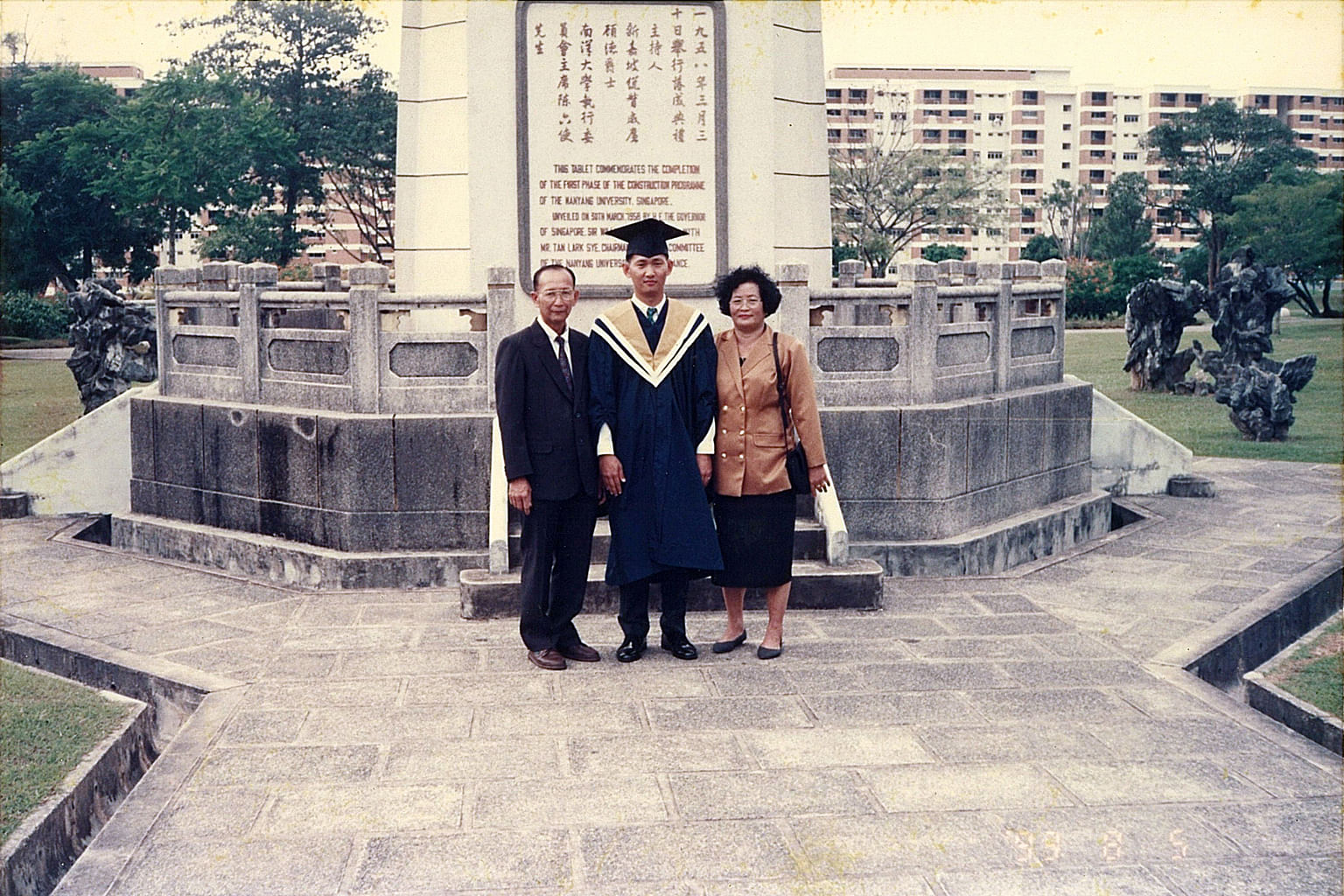
He worked hard, scored six As for his O levels and got into Anderson Junior College. He applied for and got a Flying Club Scholarship, hoping that it would pave the way for a career as a military pilot with the Singapore Armed Forces (SAF).
That dream did not come true. Although he cleared his physical and medical tests, he fared badly when interviewed by a panel of senior SAF personnel.
So he went to study civil engineering at Nanyang Technological University (NTU) instead.
His four years in the university were rough. By then dating his penpal - now his wife - from Penang, he did not know how to juggle romance and his studies.
In his first year, he failed five major subjects.
"I was very scared that I might be booted out, I thought the world was going to end," he says with a laugh.
Fortunately, he passed his supplementary examinations, but failure continued to dog him during his time in NTU.
In 1993, he graduated with a pass degree.
"I didn't even get third class honours. But NTU taught me to manage my failure, I have first class honours in managing failure," he jokes.
Securing a job interview with his less-than-impressive degree was difficult. He ended up working for a contractor and spent two years working on construction sites.
Those were instructive years, he says. "I met many who had rags-to-riches stories. Many contractors may not have high education but they have grit and street smarts, know how to seize opportunities to build their business and fortune. Many of them are tycoons now."
Over the next few years, he went through a few jobs, including one where he designed irrigation systems for a marine hardware company. Although they paid the bills, Mr Fang - who got married in 1996 - did not get the career fulfilment he craved.
Things got worse when the 1997 Asian financial crisis hit and he lost his job the year after.
In hindsight, he says that was the best thing that happened to him.
A friend who worked as a safety auditor told him the industry was worth exploring so he decided to enrol in a safety education course at Ngee Ann Polytechnic.
"Around the same time, the National University of Singapore (NUS) also advertised its master's programme in safety, health and environmental technology. I signed up," says Mr Fang who had to shuttle between NUS and Ngee Ann four or five days a week for more than a year.
To help finance his studies, he sold off his four-room HDB flat in Bukit Batok and rented an apartment in Sims Avenue.
He aced his master's which, he says, made up for his lacklustre grades at NTU.
After completing his studies, he joined a management consulting firm where he got a good grip of safety management and environmental technology services.
However, he was seized by the urge to take charge of his own destiny. Through a university classmate, he met Mr Edward Lim, who was looking for a partner to set up a firm offering safety consultancy services to construction firms.
The plan fell through but the two became friends. Mr Lim gave him his first contract worth $45,000, and with that, Mr Fang set up AKC in his bedroom.
"He is my en ren," he says, using the Chinese term for benefactor.
For the next couple of years, his was a one-man show. His office was a four-room flat in Bukit Batok which he bought after completing his master's.
The early days of AKC were rough but business slowly picked up. By the end of 2002, he started employing other consultants although he still did not have an office.
"I interviewed staff at fast-food joints in shopping centres. I didn't need an office because they were deployed to work sites," he says, adding that he leased an office in Hillview Avenue only in 2003.
His first fiscal year ending 2002 brought in revenue of more than $300,000. This grew to $700,000 the following year and more than $5 million by 2007.
But the earnings plunged with the depletion of the Government's Risk Management Assistance Fund. Small and medium-sized enterprises, which made up the bulk of his clients, depended on the fund, which was launched to help them build risk management capabilities under the Workplace Safety And Health Act.
He decided to branch out into providing safety training for foreign workers, an astute decision which gave AKC another growth spurt.
Tired of renting function rooms to conduct his training sessions, he bit the bullet and shelled out $2 million - his entire savings - to buy a building in Hillview Terrace in 2008.
Naysayers thought he was foolhardy because it was an old building in a cul de sac and with bad fengshui.
For a while, it seemed his critics were right. While working on the renovations, he contracted dengue. It got so bad that his gums started bleeding and his platelets dropped to 12,000 per microlitre of blood despite multiple transfusions (a normal person's platelet count ranges from 150,000 to 450,000 per microlitre).
"Apparently anything below 20,000 could lead to spontaneous internal bleeding. The doctor told my family I might not survive. I didn't cry in front of my family but I told heaven it could not be me, should not be me. I was too young," says the father of three sons, aged between 15 and 21.
"I just wanted to live, I didn't care if I was not a businessman, I just wanted my family back."
Miraculously, he recovered. And his business surged, thanks to the two integrated resort projects which required a lot of workers, many of whom required training.
Today, AKC provides safety training for workers in multiple industries, including shipping, logistics, manufacturing as well as oil and petrochemicals.
Mr Fang also set up ancillary businesses. Thanks to the large hordes of foreign workers who came to him for training, he ventured into the telco industry and became Singtel's biggest phonecard distributor.
He also set up a well-patronised canteen in Hillview Terrace and branched out into property investments. Today, he owns 14 landed properties, including seven units in the Hillview Terrace area.
Not everything he touched turned to gold. He had to fold two medical clinics, which he set up to offer medical screenings and other health services, because of bad "account management".
It was, he says, "a big and stupid lesson" but it taught him not to venture into projects if he did not have the know-how.
His brush with mortality has prompted him to re-evaluate not just his life but also his relationships with people and how he does business. Weighing a trim 82kg, the 1.8m tall entrepreneur quit smoking, shed 12kg and keeps fit by running and working out with weights.
Since 2010, AKC has won a slew of awards for its staff-friendly human resource practices, including WDS Best Companies for Mums (2013), NTUC Model Partnership (2014) and Most Enabling Companies for Dads (2014). It also employs past offenders and people with disabilities, and offers bursaries for deserving NTU students.
"When we have achieved something, we must not forget the people around us," he says.
His only regret is that his parents may not be aware of how far he has come. His father has advanced dementia and Parkinson's disease; his mother was debilitated by a stroke six years ago.
Asked if he has any advice for Singaporeans, he says: "Dare to dream, go out and pursue that dream and never say die. Do not be discouraged by setbacks. They make you stronger."
